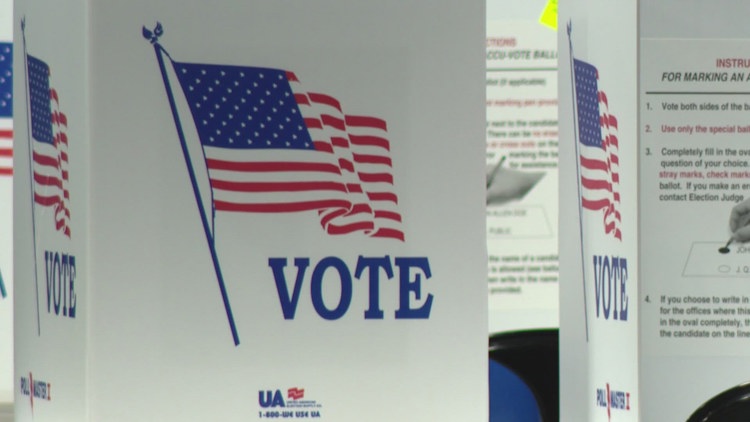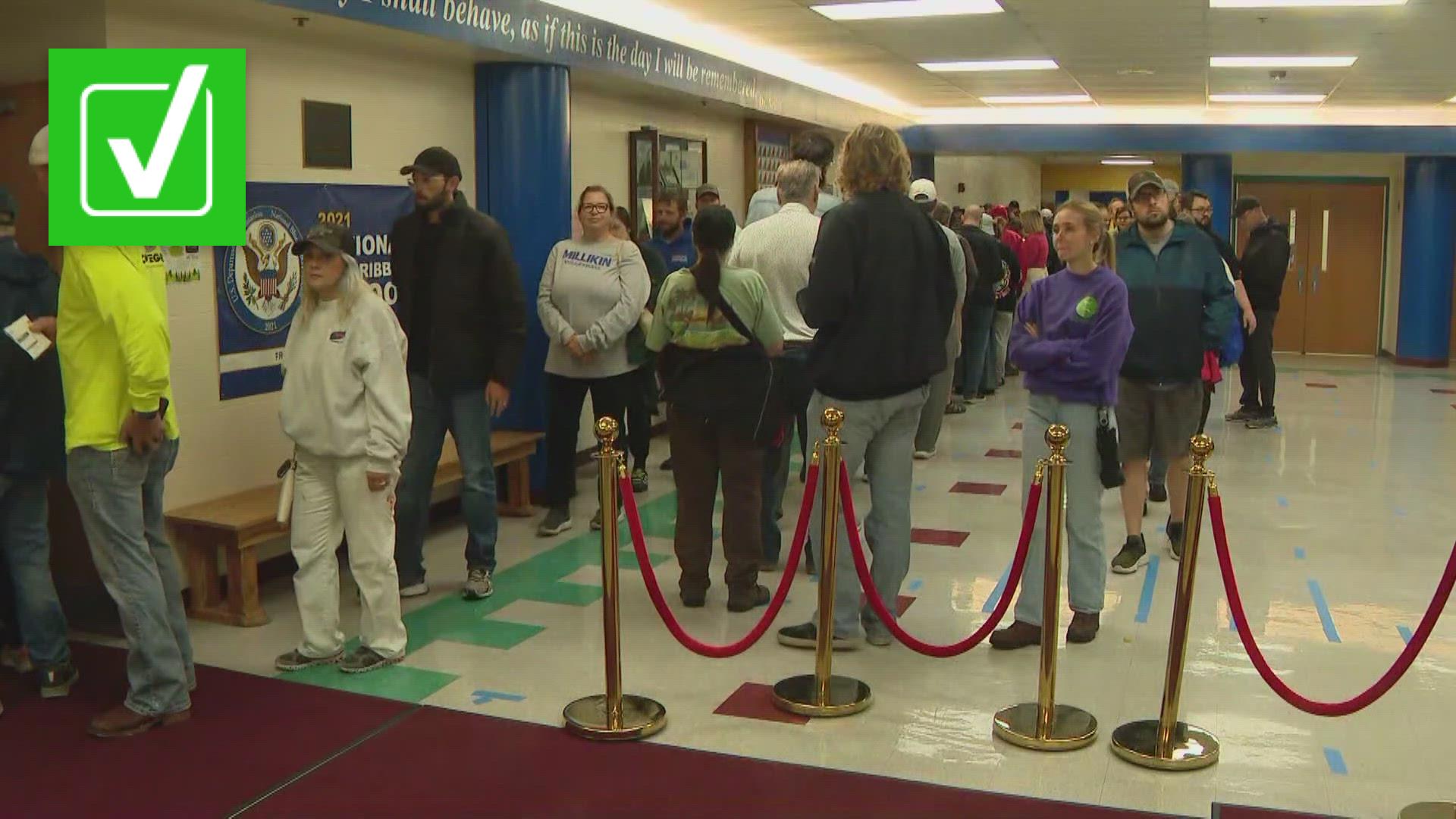ST. LOUIS — UPDATE: A U.S. District judge denied Missouri Secretary of State Jay Ashcroft's request for a temporary restraining order against the Department of Justice over poll watching plans.
In Judge Sarah Pitlyk's ruling, she ruled that Ashcroft did not prove that the Justice Department's plan would cause "irreparable harm," so she allowed the poll monitoring to take place.
During the hearing, the DOJ said they were authorized to observe the polls by a settlement between the City of St. Louis and the DOJ in 2021 over concerns about compliance with the Americans with Disabilities Act. The settlement agreement would have ended in January of 2024, but on Oct. 3, 2023, the two sides agreed to an extension allowing monitoring of polling places through July 11, 2025.
"The Court is not persuaded that the public’s interest in enforcement of Missouri’s election laws, in the absence of any non-speculative threat to election integrity, outweighs the public’s interest in the enforcement of the American with Disabilities Act in response to documented harms," Judge Pitlyk said in the ruling.
Below is the story as published Monday.
_______________________________________
Missouri Secretary of State Jay Ashcroft said on Monday he has filed a lawsuit over the U.S. Department of Justice's plan to monitor polling locations in the City of St. Louis on Tuesday.
In a statement, Ashcroft said the DOJ's monitoring was "the federal government is attempting to illegally interfere in Missouri’s elections.”
“Missouri Law is very clear," Ashcroft told 5 On Your Side. "It’s very precise about who is allowed to be in polling places and who isn’t. We want to make sure the people of Missouri have the right environment to be able to comfortably vote.”
The City of St. Louis was one of 86 jurisdictions in 27 states that the DOJ said it would be monitoring as part of its regular deployment.
“They have no place in our polling places," Ashcroft said. "They have no legal authority. I will stand up to uphold the law and protect Missourians right to vote without undue influence.”
"The department regularly deploys its staff to monitor for compliance with federal civil rights laws in elections in communities all across the country," the DOJ said in a Nov. 1 announcement.
“I specifically asked the Dept. of Justice what is your legal authority for doing this," Ashcroft said. "I don’t see it. I’m an expert on election law. I know Missouri Election law better than Federal Election law, but I know them both pretty well.”
Ashcroft said he will continue to support election officials in Missouri as the state wraps up the last day of early voting.
"The secretary of state's office has full confidence in our election authorities," Ashcroft said in the statement. "Voting has been underway for several weeks and we are ready for Election Day.”
If you see civil rights issues on election day, Civil Rights Division personnel will be available all day to receive questions and complaints from the public related to possible violations. Reports may be made through the department’s website www.civilrights.justice.gov or by calling toll-free at 800-253-3931.
The St. Louis Board of Election Commissioners reached a settlement in 2021 with the Justice Department aimed at ensuring people with mobility and vision impairments can access to polling places after federal officials found problems, such as ramps that were too steep and inaccessible parking, according to the court papers. The settlement, which expires next year, says the board must “cooperate fully” with Justice Department's efforts to monitor compliance, “including but not limited to providing the United States with timely access to polling places (including on Election Day).”
This is the second general election that Ashcroft has pushed back against DOJ election monitors in the state. In 2022, Republican election officials in Cole County pushed back against the Justice Department’s efforts to review voting access. Ashcroft said county clerk Steve Korsmeyer had declined the Justice Department’s efforts to monitor the polls.
Ashcroft accused the department of “trying to bully a hard working county official.”
Who are election monitors?
According to reporting from the Associated Press, the DOJ election monitors are lawyers who work for the U.S. government. They are not law enforcement officers or federal agents. They generally include lawyers from the Justice Department’s civil rights division and U.S. attorney’s offices across the nation. The government also sometimes brings in employees from other agencies, such as the Office of Personnel Management, who are authorized to act as monitors under a federal court order.
AP reported that the Justice Department has sent attorneys to monitor election sites and compliance with federal voting laws for more than five decades. The department’s civil rights lawyers are responsible for enforcing civil action tied to the voting statutes and protecting the right to vote.
The laws they enforce include the Voting Rights Act, along with the National Voter Registration Act and other statutes. Prosecutors in the same division also enforce criminal statutes that prohibit voter intimidation and efforts to suppress voting based on someone’s race, national origin or religion.
Some of the locations where they have been sent include areas where there were concerns in 2020, as well as locations where issues have already been raised this year.
Where are elections being monitored?
For the general election, the department will monitor for compliance with federal voting rights laws on Election Day in 86 jurisdictions, including:
- Bethel Census Area, Alaska;
- Dillingham Census Area, Alaska;
- Kusilvak Census Area, Alaska;
- North Slope Borough, Alaska;
- Northwest Arctic Borough, Alaska;
- Apache County, Arizona;
- Maricopa County, Arizona;
- Pima County, Arizona;
- Yuma County, Arizona;
- San Joaquin County, California;
- Broward County, Florida;
- Miami-Dade County, Florida;
- Orange County, Florida;
- Osceola County, Florida;
- Cobb County, Georgia;
- DeKalb County, Georgia;
- Fulton County, Georgia;
- Gwinnett County, Georgia;
- Macon-Bibb County, Georgia;
- Jefferson County, Kentucky;
- Kenton County, Kentucky;
- City of Everett, Massachusetts;
- City of Fitchburg, Massachusetts;
- City of Leominster, Massachusetts;
- City of Lowell, Massachusetts;
- City of Malden, Massachusetts;
- City of Methuen, Massachusetts;
- City of Quincy, Massachusetts;
- City of Salem, Massachusetts;
- Prince George’s County, Maryland;
- City of Ann Arbor, Michigan;
- City of Detroit, Michigan;
- City of Flint, Michigan;
- City of Grand Rapids, Michigan;
- City of Hamtramck, Michigan;
- City of Warren, Michigan;
- Hennepin County, Minnesota;
- City of Minneapolis, Minnesota;
- Ramsey County, Minnesota;
- Covington County, Mississippi;
- Scott County, Mississippi;
- Warren County, Mississippi;
- City of St. Louis, Missouri;
- Blaine County, Montana;
- Alamance County, North Carolina;
- Mecklenburg County, North Carolina;
- Wake County, North Carolina;
- Bergen County, New Jersey;
- Middlesex County, New Jersey;
- Union County, New Jersey;
- Bernalillo County, New Mexico;
- Cibola County, New Mexico;
- Clark County, Nevada;
- Queens, New York;
- Cuyahoga County, Ohio;
- Portage County, Ohio;
- Allegheny County, Pennsylvania;
- Luzerne County, Pennsylvania;
- Philadelphia County, Pennsylvania;
- City of Pawtucket, Rhode Island;
- City of Providence, Rhode Island;
- City of Woonsocket, Rhode Island;
- Charleston County, South Carolina;
- Bennett County, South Dakota;
- Jackson County, South Dakota;
- Minnehaha County, South Dakota;
- Oglala Lakota County, South Dakota;
- Atascosa County, Texas;
- Bexar County, Texas;
- Dallas County, Texas;
- Frio County, Texas;
- Harris County, Texas;
- Hays County, Texas;
- Palo Pinto County, Texas;
- Waller County, Texas;
- San Juan County, Utah;
- Hanover County, Virginia;
- Henrico County, Virginia;
- Loudoun County, Virginia;
- City of Manassas, Virginia;
- City of Manassas Park, Virginia;
- Prince William County, Virginia;
- Town of Lawrence (Rusk County), Wisconsin;
- City of Milwaukee, Wisconsin;
- Town of Thornapple, Wisconsin; and
- City of Wausau, Wisconsin.
What are the other states saying?
In a letter to the Justice Department on Friday, Texas Secretary of State Jane Nelson said wrote that “Texas law is clear: Justice Department monitors are not permitted inside polling places where ballots are being cast or a central counting station where ballots are being counted.”
“Texas has a robust processes and procedures in place to ensure that eligible voters may participate in a free and fair election," Nelson wrote.
In a similar letter Friday, Florida Secretary of State Cord Byrd told the Justice Department that Florida law lists who is allowed inside the state's polling places and that Justice Department officials are not included. Byrd said that Florida is sending its own monitors to the four jurisdictions the Justice Department plans to send staff to and they will “ensure there is no interference with the voting process.”
The Associated Press contributed to this report.



